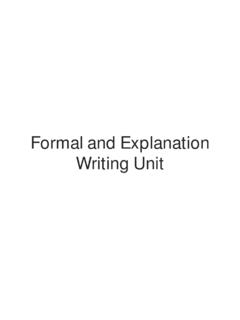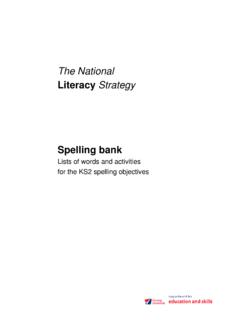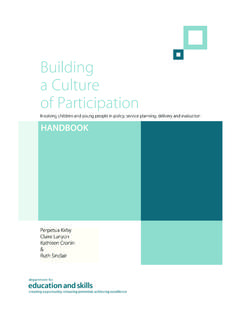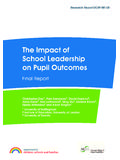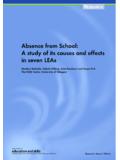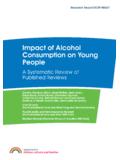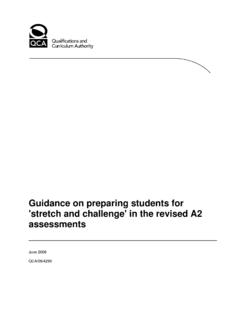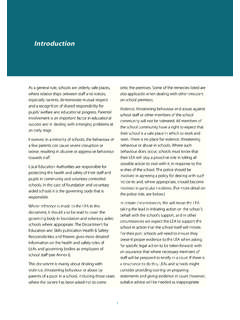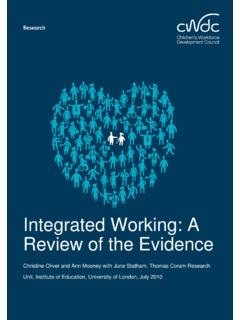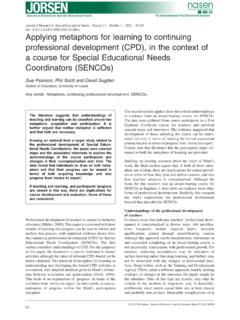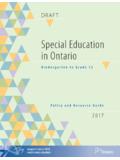Transcription of Guidance on Looked After Children with Special …
1 Guidance on Looked After Children with Special educational Needs placed out-of-authorityIntroductionAs a group, Looked After Children are nine times more likely to have a statement of Special educational needs (SEN) than the general pupil population. The majority of Looked After Children have SEN. It is important that all Children with SEN receive the educational provision which meets their needs. However, for Looked After Children , many of whom will have had difficult and unstable home and school lives before coming into care, it is imperative that their needs are quickly and efficiently assessed and provided for so that the effect of any instability on their education is reduced to a After Children can be placed to live with foster carers or in a Children s home a long way from where they would normally live and often this will be outside the area of the local authority which looks After them. Because they are placed out-of-authority there can sometimes be confusion as to the responsibilities that local authorities have towards the child if the child needs to be assessed for a statement of Special educational needs or already has one.
2 The purpose of this Guidance is to explain how local authorities responsibilities for meeting the Special educational needs of Looked After Children placed out-of-authority operate. It does not create any new obligations, but decisions made in relation to individual Children should be consistent with the operation of the law as term Looked After Children is defined in law under the Children Act 1989. A child is Looked After by a local authority if he or she is in their care or is provided with accommodation for more than 24 hours by the authority. Looked After Children fall into four main groups: Children who are accommodated under voluntary agreement with their parents (section 20); Children who are the subject of a care order (section 31) or interim care order (section 38); Children who are the subject of emergency orders for their protection (section 44 and 46); Children who are compulsorily accommodated. This includes Children remanded to the local authority or subject to a criminal justice supervision order with a residence requirement (section 21).
3 When a child comes into care the local authority will arrange a suitable care placement. In doing so, the child s allocated social worker, supported by other associated local authority services, should do all that is possible to minimise disruption to the child s education. While for many Looked After Children this will mean no changes to their educational placement, for a significant minority being taken into care will mean that they can no longer go to the same school. For about 30 per cent of Looked After Children , their care placement is not within the boundary of the authority which has taken the child into care ( an out-of-authority placement) and this will often mean a new educational placement will need to be arranged because the distance to travel to the current school is too per cent of Looked After Children have a statement of Special educational needs. Generally about 60 per cent of all Looked After Children have some form of SEN. Local authorities have a duty, where necessary, to undertake assessments, draw up and maintain statements for Children with SEN, including Looked After Children .
4 The following Guidance and practice examples are based on the Department s understanding of the law ( that the responsible local authority for assessing a child s SEN and for making and maintaining statements is the authority in which the child is ordinarily resident). In placing Looked After Children , local authorities must consider what is in the child s best interests. Responsibility for Special educational ProvisionAssessments, statementing and maintaining statements the responsible authority For Children with SEN, but without statements, it is the school in the main that will make provision for the child s Special educational needs. Relevant obligations are in section 317 of the Education Act 1996. Local authorities only incur responsibilities for Children with SEN when it becomes necessary for them to assess a child s SEN and determine Special educational provision in a statement. When a decision is made that a Looked After child must be assessed to see whether a statement of Special educational needs is required, the authority which carries out that assessment is determined by section 321(3) of the Education Act 1996.
5 Section 321(3) provides: For the purposes of Part IV of the Education Act 1996 a local education authority are responsible for a child if he or she is in their area and (a) he/she is a registered pupil at a maintained school or maintained nursery school,(b) education is provided for him at a school which is not a maintained school or maintained nursery school but is so provided at the expense of the authority,(c) he/she does not come within paragraph (a) or (b) above but is a registered pupil at a school and has been brought to the authority s attention as having (or probably having) Special educational needs, or(d) he/she is not a registered pupil at a school but is not under the age of two or over compulsory school age and has been brought to their attention as having (or probably having) Special educational term in their area is not defined in the legislation. In line with established practice, the Department construes this phrase to mean ordinarily resident in their area.
6 This means that an SEN assessment must be carried out by the authority where the child is ordinarily resident. Where a Looked After child is in a settled placement with foster parents or in a Children s home, then the authority where the foster parents are resident, or where the home is situated, will be the authority responsible for carrying out the SEN assessment and for making and maintaining any statement of Special educational it is open to local authorities to make ad hoc arrangements in individual cases. The local authority where the child is ordinarily resident could delegate the responsibility for assessing a child or making and maintaining a statement to the placing authority where, for example, there are practical reasons for doing this or in cases where this would be in the child s best interests. Clearly both authorities must be in agreement before such arrangements can go Residence Ordinary residence is also not defined in the Education Act 1996, or in any Act of Parliament.
7 However, the concept of ordinary residence was held by the House of Lords to imply the following1:Ordinary residence is established if there is a regular habitual mode of life in a particular place for the time being , whether of short or long duration , the continuity of which has persisted apart from temporary or occasional absences. The only provisos are that the residence must be voluntary and adopted for a settled purpose assessing whether a settled purpose lies behind the adoption of a particular place of residence, it is necessary to consider whether the residence shows a sufficient degree of continuity. This does not mean that the person must intend to stay in the place indefinitely. He or she may have a settled purpose even though it is for a strictly limited period. Settled in this context means fixed or predetermined , as opposed to merely casual. A person may become ordinarily resident immediately when they move to a different place. It is also possible for a person, initially moving somewhere for a temporary purpose not constituting ordinary residence, to become ordinarily resident through a change of intention.
8 As a general rule it may be assumed that a child under the age of 16 shares the same place of ordinary residence as his or her parents (even if the child is away at boarding school)3. The ordinary residence of Looked After Children placed away from home, older Children , those whose parents are living apart and those who have been left in the care of other relatives may be more difficult to determine. If the child s age and means are such that he or she is capable of deciding for himself where he will live and exercises such a choice, his place of ordinary residence will be where he chooses to cases of Children in care who are placed by a local authority, either with foster carers, or in boarding schools, are discussed further in later R -v- Barnet LBC ex parte Shah [1983] 1 All ER 2262 It was also said that Ordinary residence is proven more by evidence of matters capable of objective proof than by evidence as to state of Re P(GE) (an infant) [1964] 3 All ER 977 Making a new assessmentGenerally for Looked After Children placed out-of-authority, where it becomes necessary to conduct an assessment of their Special educational needs, the local authority in which they are ordinarily resident will be the authority responsible for undertaking the assessment.
9 Should there be a statement, then that authority will maintain it. Being an out-of-authority Looked After child should make no difference to the assessment process. The placing local authority should be engaged in the process where they are the corporate parent of the child and should advocate for and support the child in the same way as any good parent with existing statementsWhen an out-of-authority placement is made for a child who already has a statement of Special educational needs, generally that statement should transfer to the authority where the child will be living. As an educational placement should be secured at the same time as the care placement both the school and the receiving authority should be aware that this will be happening. Good practice is that local authorities should always discuss moves of Looked After Children with receiving authorities before a final decision is made as this is a good way to ensure such placements are made as smoothly as possible. The transfer of the statement is provided for by Regulation 23 of The Education ( Special educational Needs) (England) (Consolidation) Regulations 2001 and the new authority should treat such a transfer in the same way as any other.
10 The receiving authority must continue to maintain the existing statement and can consider bringing forward arrangements for a review of the statement. The maintenance of the statement remains the responsibility of the receiving authority until such time as circumstances may change so that they are no longer responsible. More details can be found in Chapter 8 (8:113 onwards) of the SEN Code of the placing authority no longer maintains the statement, in the case of Looked After Children , they will still have financial responsibility for the Special educational provision set out in the statement because the child continues to belong to them as determined by regulation 7 of The Education (Areas to which Pupils and Students Belong) Regulations 1996 (the Belonging Regulations ). The receiving authority will be able to recoup the cost of the statement through the normal recoupment process see the section relating to financial responsibility. The placing authority will still be under a duty to promote the educational achievement of the child for as long as the child continues to be Looked After by them, and should therefore continue to advocate for that child in the same way as any good parent would.
